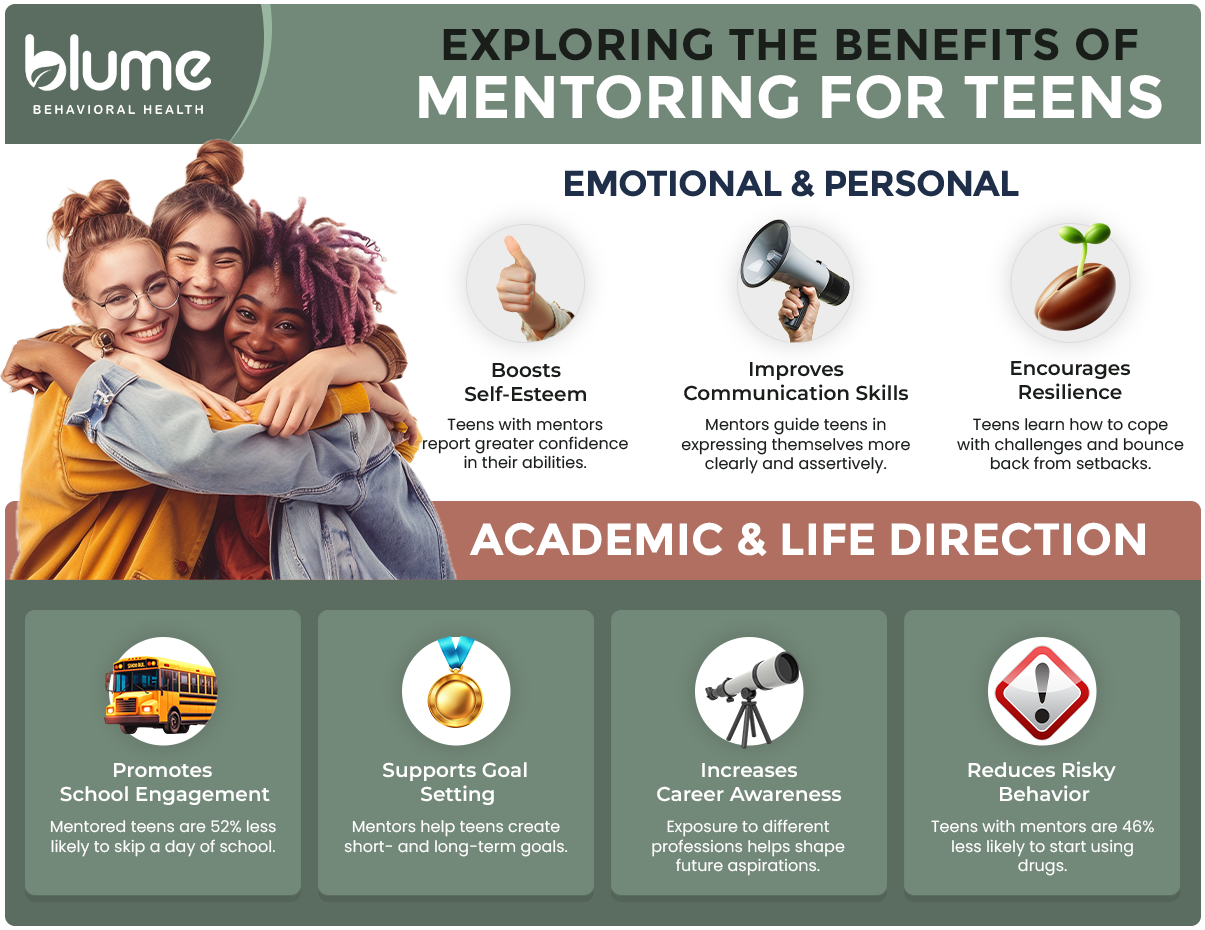Mentoring is a powerful tool that can significantly enhance the lives of young people. For teens, having a mentor provides valuable guidance, unwavering support, and much-needed encouragement during a critical developmental period. Studies have shown that teens with mentors are more likely to succeed academically, build healthier relationships, and make positive life choices. The positive influence of a mentor helps young people navigate the challenges of adolescence, build self-confidence, and develop essential life skills.
Blume Behavioral Health in Redondo Beach, CA, recognizes the importance of mentoring and has developed a unique program tailored specifically for teens. Each young person is paired with a therapist and a mentor in their 20s or 30s, ensuring they receive personalized support and guidance. This comprehensive approach fosters personal growth, resilience, and emotional well-being, helping teens reach their full potential and thrive.
What is Mentoring for Teens?
Mentoring for teens is a supportive relationship where an experienced adult, known as a mentor, provides guidance and encouragement to a young person. This relationship helps teens navigate life’s challenges, make informed decisions, and set goals for their future. A mentor offers a listening ear, shares life experiences, and provides valuable advice, all while fostering a sense of trust and respect. This supportive bond can significantly boost a teen’s confidence, academic performance, and overall well-being.
Mentoring programs can be found in schools, community centers, and online, making them accessible to many teens. Whether it’s helping with schoolwork, planning for college, or dealing with personal issues, a mentor’s guidance can make a huge difference in a teen’s life, paving the way for a brighter and more confident future.
What are the Benefits of Mentoring for Teens?

Enhanced Self-Esteem
Boosts confidence and self-worth.
Goal Setting
Helps teens set and achieve personal goals.
Career Exploration
Introduces various career options and pathways.
Networking Opportunities
Connects teens with professionals in their field of interest.
Emotional Support
Provides a safe space to express feelings and concerns.
Resilience Building
Teaches coping strategies and resilience.
Cultural Awareness
Exposes teens to diverse viewpoints and experiences.
Community Engagement
Encourages involvement in volunteer and civic activities.
Positive Role Modeling
Demonstrates positive behaviors and attitudes.
Empathy Development
Fosters understanding and compassion towards others.
Overall, the benefits of mentoring are extensive, providing teens with the support and resources they need to navigate the challenges of adolescence, leading to more successful and fulfilling lives.
Potential Educational Benefits
Mentoring can provide significant educational benefits for teenagers, contributing to their academic success and overall development.
Improved Academic Performance
One of the key benefits of mentoring is that mentors often help teens develop better study habits and time management skills, leading to improved grades and academic performance. By providing personalized guidance, academic programs, and support, mentors can address specific academic challenges and help teens stay focused on their educational goals.
Enhanced Motivation and Engagement
Another benefit of mentoring is increased motivation and engagement in school. Mentors encourage a positive attitude toward learning and help teens see the value in their education. This increased enthusiasm can lead to greater participation in class and extracurricular activities.
Goal Setting and Achievement
Mentors assist teens in setting realistic and achievable academic goals. They provide support and encouragement to help teens stay on track and work towards these goals. This process of goal setting and achievement can build a sense of accomplishment and self-efficacy, highlighting one of the many benefits of mentoring.
Better Study and Learning Techniques
Mentors can introduce teens to effective study techniques and learning strategies tailored to their individual needs. This can include tips on note-taking, test preparation, and time management. By adopting these techniques, teens can improve their ability to retain information and perform well academically.
Improved Attitudes Toward School
Mentoring relationships can foster a more positive attitude toward school and learning. Mentors provide encouragement and support, helping teens develop a greater appreciation for education. This positive outlook can reduce absenteeism and increase a teen’s commitment to their studies.
Access to Educational Resources
Mentors often have knowledge of and access to various educational resources that can benefit teens. This can include tutoring programs, scholarships, internships, and extracurricular activities. By connecting teens with these resources, mentors help them take advantage of additional opportunities to enhance their education.
Development of Critical Thinking and Problem-Solving Skills
Through discussions and activities, mentors can help teens develop critical thinking and problem-solving skills. These skills are essential for academic success and can be applied across various subjects and real-life situations.
Increased College and Career Readiness
Mentors can provide valuable advice on college selection, application processes, and career planning. They help teens understand the steps needed to pursue higher education and future careers, making the transition from high school to college or the workforce smoother and more informed.

Potential Behavioral Benefits
Mentoring can provide significant behavioral benefits for teenagers, helping them develop positive habits and attitudes.Reduced Risky Behavior
One of the key benefits of mentoring is its association with lower rates of risky behaviors such as substance abuse and delinquency. Mentors provide guidance and support, helping teens make healthier choices and avoid negative influences.Improved Self-Discipline
Mentors help teens develop self-discipline by setting expectations and encouraging them to take responsibility for their actions. This increased self-discipline can lead to better decision-making and more responsible behavior in various aspects of their lives, contributing to improved mental health by reducing anxiety disorders and depression disorders.Enhanced Emotional Regulation
Another benefit of mentoring is improved emotional regulation. Mentors teach teens coping strategies for managing stress, anger, and other strong emotions. This helps teens respond to challenges more calmly and effectively.Positive Role Modeling
Mentors serve as positive role models, demonstrating appropriate behavior and attitudes. This exposure to positive role models is one of the significant benefits of mentoring, as it helps teens adopt similar behaviors and develop a strong moral foundation.Increased Accountability
Through regular interactions and goal-setting activities, mentors hold teens accountable for their actions. This accountability encourages teens to follow through on commitments and take ownership of their behavior.Better Social Interactions
Mentoring improves teens’ social interactions by teaching them effective communication and conflict-resolution skills. These improved social skills can lead to healthier relationships with peers, family members, and others.Greater Empathy and Understanding
Mentors help teens develop empathy and understanding toward others by exposing them to diverse perspectives and experiences. This increased empathy is another important benefit of mentoring, fostering more compassionate and considerate behavior.Enhanced Problem-Solving Skills
Mentors guide teens in developing problem-solving skills, helping them approach challenges with a constructive mindset. This ability to solve problems effectively can reduce impulsive and negative behaviors.Increased Resilience
Mentors help teens build resilience by teaching them how to cope with setbacks and persevere through difficulties. This increased resilience is a crucial benefit of mentoring, as it enables teens to navigate life’s challenges with greater strength and confidence.What Are The Potential Benefits of Mentoring Teens For The Mentors?
While mentoring teens offers a vast array of benefits for the young individuals involved, it also brings significant advantages for the mentors themselves. By engaging in the mentoring process, mentors not only contribute positively to the lives of their mentees but also experience personal and professional growth. Here are some potential benefits of mentoring for the mentors:Personal Fulfillment
Mentors often experience a deep sense of satisfaction and personal fulfillment from helping teens grow and succeed. Knowing they have made a positive impact on a young person’s life can be incredibly rewarding.Enhanced Leadership Skills
Mentoring helps mentors develop and refine their leadership skills. Guiding and supporting a teen through challenges enhances their ability to lead and inspire others.Improved Communication Skills
Regular interactions with teens improve mentors’ communication skills. They learn to convey ideas clearly, listen actively, and provide constructive feedback.Renewed Perspective
Mentoring provides mentors with fresh perspectives and insights. Interacting with younger individuals can offer new ways of thinking and understanding current trends and issues.Professional Development
Mentoring can contribute to a mentor’s professional growth. It demonstrates leadership and commitment, which are valuable in any career. Some organizations also recognize and reward mentoring efforts.Building Patience and Empathy
Working with teens requires patience and empathy. Mentors develop these qualities as they learn to understand and respond to the unique challenges and needs of their mentees.Networking Opportunities
Mentoring can expand a mentor’s network. Through mentoring programs, mentors meet other professionals and community leaders, broadening their connections.Sense of Community
Mentors often feel a stronger sense of community involvement and connectedness. They contribute to the betterment of their community by investing in its future leaders.Personal Growth
Mentors experience personal growth as they reflect on their own experiences and values while guiding their mentees. This self-reflection can lead to greater self-awareness and personal development.Legacy Building
Mentors have the opportunity to leave a lasting legacy by shaping the next generation. The positive influence they have on their mentees can have ripple effects, impacting the broader community and future generations.Blume Behavioral Health Offers Mentorship for Teens in Redondo Beach, CA
Unlock your teen’s potential with Blume Behavioral Health’s comprehensive mentorship program in Redondo Beach, CA. Our program is designed to provide the guidance, support, and resources that teens need to navigate the challenges of adolescence successfully. By enrolling your teen, you are giving them access to experienced mentors who can help them with personal growth, emotional support, social skills, career guidance, and cultural awareness. Take the first step towards a brighter future for your teen and enroll them in Blume Behavioral Health’s mentorship program. Contact us today!References:Dr. Aneta Lotakov Prince is a board-certified psychiatrist with over 20 years of clinical experience treating adolescents and adults facing severe mental illness, co-occurring substance use disorders, and complex emotional and behavioral health challenges. Certified by the American Board of Psychiatry and Neurology, she holds an active DEA registration and California medical license. Dr. Prince’s patient-centered approach is rooted in compassion and driven by a dedication to improving quality of life and supporting long-term recovery. She remains deeply committed to empowering each individual she works with to build a life of purpose, connection, and resilience.

